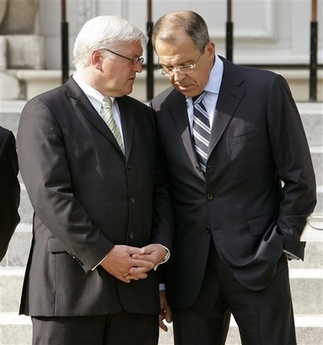PARIS - Frustrated world powers agreed Wednesday to send Iran before the
United Nations Security Council for possible punishment, saying the Iranians had
given no sign they would bargain in earnest over their disputed nuclear program.

Russian Foreign
Minister Sergey Lavrov, right, and German Foreign Minister Frank-Walter
Steinmeie, speak after their meeting at the French foreign ministry in
Paris, Wednesday, July 12, 2006. Foreign ministers from China, France,
Russia, Britain, Germany and the U.S. trying to persuade Iran to give up
its nuclear program.[AP] |
The move amounted to calling Iran's bluff. Diplomats said recent meetings
with Iran's nuclear negotiator have gone nowhere and it was clear Tehran hoped
to play for time or exploit potential divisions among the six powers that have
offered new talks.
The United States and other nations wanted Iran to say by Wednesday whether
it would meet terms to begin negotiations on a package of economic and energy
incentives in exchange for at least a short-term end to Tehran's program to
enrich uranium.
The Security Council's permanent members said Iranian leaders had had long
enough to respond.
"The Iranians have given no indication at all that they are ready to engage
seriously on the substance of our proposals," French Foreign Minister Philippe
Douste-Blazy said on behalf of the United States, France, Britain, Russia and
China, the five permanent Security Council members, plus Germany and the
European Union.
Though Russia and China signed on to Wednesday's statement, the two
traditional commercial partners of Iran previously have opposed imposition of
the toughest of sanctions.
Russian Foreign Minister Sergey Lavrov expressed his disappointment with Iran
for not responding to the proposals. In a veiled warning that Russia could
soften its opposition to sanctions, Lavrov said that if Tehran does not agree to
return to negotiations "the Security Council will consider steps appropriate to
the situation," the ITAR-Tass news agency reported.
If Iran agrees to the group's terms for negotiations, it would mean the first
high-level face-to-face talks between the United States and Iran after more than
a quarter century of estrangement.
The group that met in Paris on Wednesday represents the permanent,
veto-holding members of the UN Security Council plus the European participants
in previous failed nuclear talks with Iran. Tehran contends its nuclear program
is aimed only at producing electricity, but the West fears it is hiding plans to
build a bomb.
Expressing "profound disappointment," foreign ministers said, "we have no
choice but to return to the United Nations Security Council" and resume a course
of possible punishment or coercion that the powers had set aside in hopes of
reaching a deal.
The group was pushing for an agreement before world leaders meet this weekend
in Russia for the Group of Eight summit of leading industrial democracies.
President Bush and other leaders are now expected to issue a strongly worded
rebuke to Iran during the G-8 meeting.
Undersecretary of State Nicholas Burns, the Bush administration's chief
negotiator on the Iran issue, said the U.S. is pleased by what it called strong
action by the Security Council group.